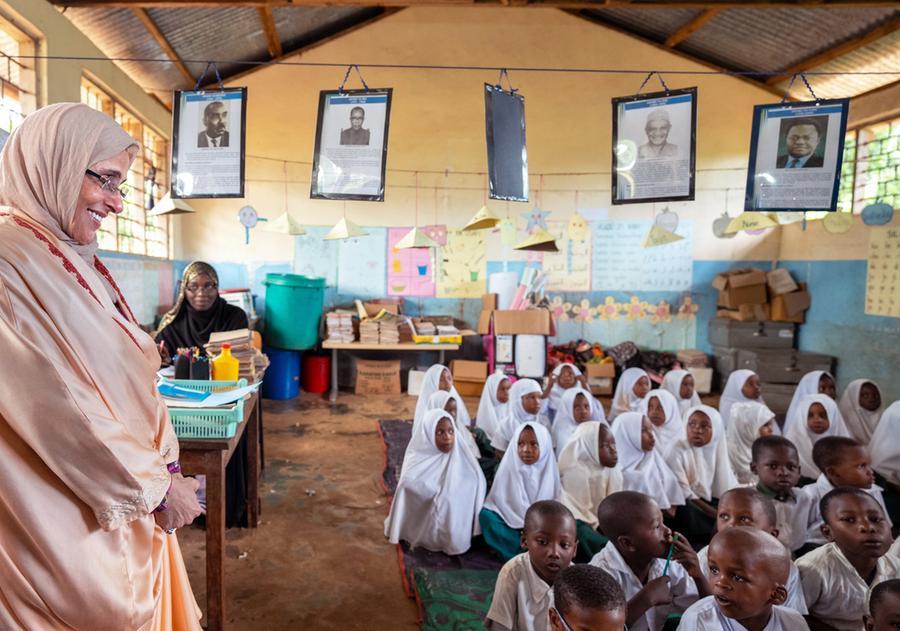
- Jawaher Al Qasimi:
- Any initiative that enhances the quality and accessibility of knowledge for younger generations is key to the development process.
- The sustainability and growth of humanitarian efforts begin with schools in underprivileged communities.
Zanzibar: Her Highness Sheikha Jawaher bint Mohammed Al Qasimi, wife of His Highness the Ruler of Sharjah and Chairperson of The Big Heart Foundation (TBHF), Eminent Advocate for Refugee Children at the United Nations High Commissioner for Refugees (UNHCR), has directed TBHF to develop and upgrade water and sanitation facilities in 12 schools across four regions of Zanzibar. This strategic initiative aims to create a healthier, more conducive learning environment for children in these communities, promoting awareness of healthy living practices and supporting the uninterrupted continuation of their education.
This announcement follows Her Highness Sheikha Jawaher Al Qasimi’s recent visit to Zanzibar, where she met with H.E. Leila Mohammed Musa, Minister of Education and Vocational Training, along with other officials from key development and education sectors. During her visit, Her Highness toured one of the schools that serves approximately 1,000 students daily but is critically underserved in terms of water and sanitation facilities. With only four toilets (two for boys and two for girls), this equates to one toilet per 240 students, along with a severe lack of basic water hygiene resources.
Fully funded by TBHF and implemented by Save the Children, this project is designed to directly address the pressing infrastructural and educational challenges faced by schools in Zanzibar. The initiative includes the construction of 20 sanitation facilities across 12 of 28 primary schools, alongside significant improvements in water access and hygiene provisions in 10 schools. The project is tailored to meet age, gender, and special needs requirements. Furthermore, it features an educational component aimed at raising awareness among students and parents on global water and hygiene standards, while also supplying essential hygiene items to ease financial pressure on families. This initiative is expected to benefit more than 21,000 students across the regions of Unguja, Kaskazini A, Kati, Pemba, Micheweni, and Mkokoni.
Sheikha Jawaher Al Qasimi underscored that providing education in a healthy and supportive school environment is an essential right for all children. She highlighted that initiatives aimed at enhancing the quality and accessibility of education for future generations are crucial for achieving comprehensive and sustainable development. Such efforts not only benefit the children and students but also lay the foundation for the long-term prosperity of entire countries and communities. She emphasized that sustainable humanitarian work and the creation of growth opportunities begin in schools within underserved communities, where children can acquire the tools needed for self-empowerment and become catalysts for shaping the future of their societies.
Her Highness stated: “Humanitarian projects that contribute to the development of countries, both regionally and globally, reflect the core vision of the UAE under the leadership of His Highness Sheikh Mohamed bin Zayed bin Sultan Al Nahyan, President of the UAE, to support communities in their pursuit of progress. These initiatives also align with TBHF’s strategic focus on key sectors that drive societal transformation, including education, healthcare, housing, and stability. These are the critical pillars that enable disadvantaged communities to recover and overcome challenges at every level.”
During her visit to the classrooms, Her Highness engaged with several students, listening to their aspirations, needs, and the primary obstacles they face in continuing their education. She also met with the families of some students, gaining insight into their experiences.
A 2016 assessment, conducted in accordance with international standards and guidelines, revealed that 20% of primary school students, particularly those with special needs, do not have access to adequate public facilities. Furthermore, 74.7% of schools suffer from severe shortages of water and essential sanitation supplies, adversely impacting the health of the entire school community and contributing to increased absenteeism.
Social Media Video Link: https://we.tl/t-fdFCTIIihj









